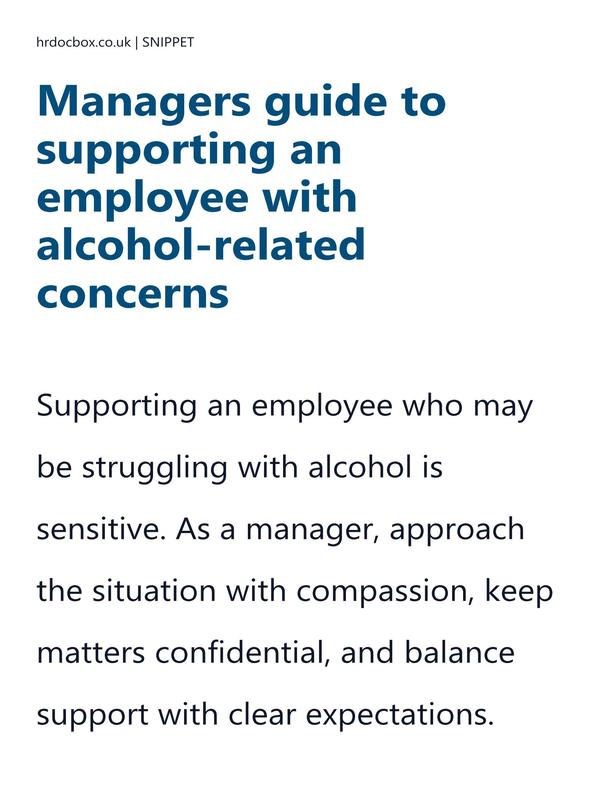Managers guide to supporting an employee with alcohol-related concerns


Our Guide to Supporting an Alcoholic Employee offers strategies to approach, assist, and guide employees dealing with alcohol-related challenges, fostering a supportive workplace.
- Includes 12 months' access to the Managers guide to supporting an employee with alcohol-related concerns, with all updates provided free of charge and notified to you.
- UK-specific accuracy.
- 419 words over 2 pages.
- Last updated 16/09/2025.
- Format: Word / PDF / plain text / email.
- Delivery: Instant download after purchase (no physical item).
- Access: Download link shown here after checkout.
- This Managers guide to supporting an employee with alcohol-related concerns will SAVE you up to 1 hour 30 mins research, save you money, and reduce your risk.
Managers guide to supporting an employee with alcohol-related concerns
Supporting an employee who may be struggling with alcohol is sensitive. As a manager, approach the situation with compassion, keep matters confidential, and balance support with clear expectations.
Spotting the signs
- Regular lateness or unexplained absences
- Decline in work performance or missed deadlines
- Noticeable changes in behaviour or mood
- Concerns raised by colleagues (handled carefully and confidentially)
If you notice these patterns, take action early — do not wait until the situation escalates.
Step 1: First conversation (Week 1)
- Arrange a private, confidential meeting.
- Focus on observed behaviours, not assumptions (e.g., “I’ve noticed three instances of lateness this week…”).
- Express concern for wellbeing and offer support.
- Explain available resources: GP, Employee Assistance Programme (EAP), Alcoholics Anonymous, counselling.
- Make a brief confidential
This is a 30% preview of the Managers guide to supporting an employee with alcohol-related concerns. For instant full access, purchase this item or a parent bundle.
Managers guide to supporting an employee with alcohol-related concerns purpose
Employers have a responsibility to support employees who are struggling with alcoholism. Here are some reasons why employers should support an alcoholic employee:
-
Legal obligations: Employers have legal obligations to provide a safe and healthy workplace. An employee who is struggling with alcoholism may pose a risk to themselves and others if they are under the influence while on the job. Supporting the employee in their recovery can help to mitigate these risks.
-
Employee retention: Alcoholism can lead to absenteeism, decreased productivity, and turnover. Supporting an alcoholic employee can help to improve their job performance, reduce absenteeism, and increase their loyalty to the company.
-
Humanitarian reasons: Alcoholism is a disease, and employees who are struggling with this disease deserve compassion and support. Providing support for employees who are struggling with alcoholism is the right thing to do from a humanitarian perspective.
-
Corporate social responsibility: Supporting employees who are struggling with alcoholism is part of a company's broader social responsibility to promote health and well-being in the workplace.
-
Employee morale: Providing support for an alcoholic employee can help to improve overall employee morale. It shows that the company cares about the well-being of its employees and is committed to providing a safe and healthy workplace.
In summary, supporting an alcoholic employee is the right thing to do from a legal, humanitarian, and social responsibility perspective. It can also benefit the company by improving employee retention, job performance, and morale.
